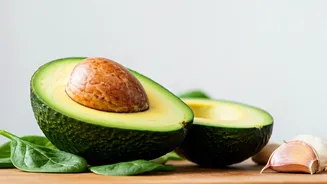Oats: Heart's Ally
Oats are a champion for heart health, known for their ability to significantly reduce cholesterol levels. They are rich in soluble fiber, which forms a gel-like
substance in the digestive system, binding with cholesterol and preventing its absorption. This process helps to lower LDL (bad) cholesterol, a major contributor to heart disease. Including oats in your diet is simple; a bowl of oatmeal for breakfast is a delicious and effective way to start the day. Moreover, you can add oats to smoothies, baked goods, or even use them as a coating for chicken or fish to boost their cholesterol-lowering potential. Studies suggest that consuming just 1.5 cups of cooked oatmeal daily can reduce total cholesterol by 5% to 8%. This makes oats a readily available and impactful addition to a heart-healthy diet. Regular consumption of oats can also improve overall digestion and provide a feeling of fullness, aiding in weight management, which further benefits heart health. To maximize the benefits, consider using whole-grain oats and pairing them with other cholesterol-lowering foods such as fruits and nuts.
Nuts: Nutritional Powerhouses
Nuts are packed with nutrients, making them a valuable addition to a heart-healthy diet. They are a good source of monounsaturated and polyunsaturated fats, which can help lower LDL cholesterol while increasing HDL (good) cholesterol. Regularly eating nuts, such as almonds, walnuts, and pecans, has been linked to a reduced risk of heart disease. These nuts also provide fiber, which further aids in cholesterol reduction by preventing its reabsorption in the gut. While nuts are beneficial, they are calorie-dense, so moderation is essential. A handful of nuts per day—around 1.5 ounces—is generally recommended to reap their benefits without overdoing calorie intake. Including nuts as snacks, adding them to salads, or incorporating them into meals provides a crunchy texture and satisfying flavor while offering significant heart health advantages. Choosing unsalted nuts is best to limit sodium intake, and variety is key to ensure you get a range of nutrients. Nuts also contain vitamin E, an antioxidant that protects cells from damage and supports overall cardiovascular health. Consider adding walnuts for their omega-3 fatty acids, almonds for their vitamin E, or cashews for their minerals, and embrace a handful each day for heart health.
Beans: Fiber Boost
Beans are a fantastic source of soluble fiber, which plays a crucial role in lowering cholesterol levels. When beans are digested, the soluble fiber binds with cholesterol in the digestive tract, preventing it from being absorbed into the bloodstream. This process helps reduce the levels of LDL cholesterol, contributing to a lower risk of heart disease. Beans are also low in fat and calories, making them a healthy addition to any diet. Including beans in your meals is versatile and easy. You can add them to soups, stews, salads, or even make bean burgers. They also offer a good source of plant-based protein, which can help you feel full longer, potentially aiding in weight management. Regular consumption of beans has been linked to improved heart health, thanks to their ability to lower LDL cholesterol and provide essential nutrients. Choose from a variety of beans—such as kidney beans, black beans, and chickpeas—to add flavor and nutrition to your diet. The American Heart Association recommends that individuals consume at least 25 grams of fiber daily, and beans can make a significant contribution to achieving this goal. By incorporating beans into your diet, you're taking a positive step toward heart health, improving digestion, and maintaining healthy cholesterol levels.
Fatty Fish: Omega-3 Benefits
Fatty fish, such as salmon, mackerel, and sardines, are rich in omega-3 fatty acids, which are highly beneficial for heart health. Omega-3s help to reduce triglycerides, a type of fat in the blood that can increase the risk of heart disease. They also have anti-inflammatory properties, which can help to reduce inflammation in the arteries. Incorporating fatty fish into your diet is a delicious and effective way to support your heart health. Experts recommend consuming fatty fish at least twice a week. You can bake, grill, or pan-sear fish to maintain its nutritional integrity. Consider adding salmon to your weekly meal plan for its richness in omega-3s, which protect against irregular heartbeats and reduce blood pressure. Beyond omega-3s, fish also provide lean protein, which is essential for overall health and well-being. Regular consumption of fatty fish can improve overall cardiovascular health, contributing to lower blood pressure, reduced risk of blood clots, and improved cholesterol profiles. By integrating fatty fish into your diet, you provide your body with essential nutrients that support a healthy heart.
Avocados: Heart-Healthy Fats
Avocados are a great source of monounsaturated fats, which help to lower LDL cholesterol levels and raise HDL cholesterol. The presence of these healthy fats makes avocados a heart-friendly food. Besides their fat content, avocados also provide fiber, which aids in reducing cholesterol by binding with it in the digestive tract. Their high fiber content promotes a feeling of fullness, which can assist in weight management—a critical factor in maintaining heart health. Adding avocados to your meals is simple. You can add slices to salads, sandwiches, or enjoy them as a dip, like guacamole. Their creamy texture and mild flavor make them a versatile ingredient. Avocados are also rich in vitamins and minerals, including potassium, which helps regulate blood pressure. Regular consumption of avocados has been linked to improved cardiovascular health. By incorporating avocados into your diet, you can enjoy a nutritious food that lowers harmful cholesterol and supports a healthy heart. They are a convenient and tasty way to improve overall health and well-being.
Olive Oil: Versatile Choice
Olive oil is rich in monounsaturated fats and antioxidants, which are known to reduce LDL cholesterol levels and protect against heart disease. Using olive oil in place of saturated fats, like butter or lard, can significantly improve your heart health. Olive oil is versatile and can be used in various cooking methods, including sautéing, baking, and as a dressing. Choose extra virgin olive oil for its higher antioxidant content and flavor. Its antioxidants also fight inflammation and reduce oxidative stress in the body. Using olive oil in your daily diet is easy; add it to salads, use it for sautéing vegetables, or drizzle it over your dishes. Research shows that people who regularly consume olive oil have a lower risk of heart disease, primarily due to its ability to lower cholesterol and improve overall cardiovascular health. Incorporating olive oil into your daily diet is an accessible way to support heart health, adding flavor and essential nutrients to your meals. Make it a staple for a healthy heart.
Plant Sterols: Cholesterol Blockers
Plant sterols and stanols are naturally occurring substances found in plants that can help lower cholesterol levels. They function by blocking the absorption of cholesterol in the small intestine, leading to lower levels of LDL cholesterol in the bloodstream. You can find plant sterols and stanols in some fortified foods, such as certain yogurts, cereals, and orange juice. These foods are designed to help you consume more of these beneficial compounds. The recommended intake of plant sterols and stanols is typically between 1.5 to 2 grams per day to achieve significant cholesterol reduction. Incorporating these foods into your diet is a proactive measure for improving heart health. Plant sterols and stanols provide an additional layer of protection against high cholesterol, adding to the benefits of a balanced diet. Combining plant sterol-fortified foods with other cholesterol-lowering strategies, such as a diet rich in soluble fiber and regular exercise, can provide even better results. They are a practical way to manage cholesterol levels and protect your heart health.



















